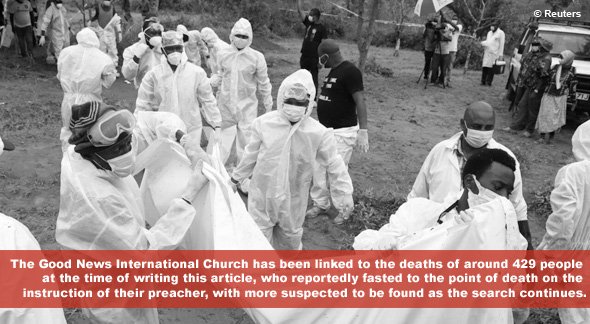Lost in Faith: The Growing Menace of Religious Fanaticism in Africa and the Need for Intervention
Posted: 7 June, 2024 Filed under: Murithi Antony | Tags: Africa, African Charter on Human and Peoples' Rights, Boko Haram, child sacrifice, ethical principles, fasting to the point of death, fundamental human rights, Good News International Church, human sacrifices, international human rights instruments, Mungiki movement, political instability, religion, religious fanaticism, religious freedom, right to religious freedom, terrorism, Yesu wa Tongaren Leave a comment Author: Murithi Antony
Author: Murithi Antony
LL.B candidate, University of Embu
Religious freedom is a cherished right we uphold,
But when it’s misused, the consequences unfold.
Ideologies that propagate self-harm and hate,
Demand constant vigilance before it’s too late!
Introduction
Religion is a system of faith and worship centered around a belief in a supreme being and a set of moral or ethical principles. It encompasses a way of life that provides hope, guidance, and even companionship to many individuals. Religion serves as a source of strength, comfort, and meaning, especially for individuals who seek to understand their place in the world and the purpose of their existence. Religion influences people’s thoughts, actions, and their relationships with others. Such characteristics of religion has made several believers to engage in extreme and controversial actions, including among others; human sacrifices, fasting to the point of death, and terrorism, believing that they will receive eternal rewards from their deity. Such is what is depicted as religious fanaticism, which must be regulated for the sake of sanity and protection of fundamental human rights in society. Upon this background, this article aims to analyse the status of religious freedom in Africa, the impact of the emergence of religious fanaticism, and advocate for intervention.
The Right to Religious Freedom in Africa.
The right to religious freedom is a fundamental human right enshrined in constitutions of different African countries as well as international human rights instruments. The constitution of Kenya, for instance, provides that every person has the right to freedom of conscience, religion, thought, belief and opinion, and that every person has the right, either individually or in community with others, in public or in private, to manifest any religion or belief through worship, practice, teaching or observance, including observance of a day of worship. Equally, the constitution of Rwanda protects the rights of individuals to choose or change their religion and prohibits discrimination based on religion or faith, which is punishable by law. Other international legal instruments which provide for the right to freedom of religion include the African Charter on Human and Peoples’ Rights (Article 8), Universal Declaration of Human Rights (Article 18), and International Covenant on Civil and Political Rights (Article 18). However like many other rights, the freedom of religion may be subjected to reasonable limitations.

Religious Fanaticism in Africa.
Recently, there has been a notable increase in the number of fanatical religious movements in Africa. These movements, known for their extreme beliefs and practices, have been attracting followers from various backgrounds and are gaining traction in multiple African nations. In Kenya, for instance, a preacher known as ‘Yesu wa Tongaren’ (Jesus of Tongaren) has identified himself as the Biblical Jesus and has garnered a following of individuals who view him as their messiah. Similarly, the Good News International Church has been linked to the deaths of around 429 people at the time of writing this article, who reportedly fasted to the point of death on the instruction of their preacher, with more suspected to be found as the search continues. The controversial preacher as also been accused of advising youths to drop out of school, quit their jobs and refrain from getting medical services because these are unholy. Additionally, Kenya has faced religiously-motivated violence. The Mungiki movement, which has been associated with killing people during the 2007/2008 post-election violence, has been described as a religious cult. Moreover, Islamic extremists have attacked Kenya under the guise of waging jihad.
Several other African countries have also been affected by this issue. In west Africa, Nigeria has endured a prolonged period of conflict and turmoil, with the fundamentalist Islamist movement Boko Haram transforming the northern region of the country into a battlefield, resulting in the tragic loss of countless lives and the displacement of numerous families. Similarly, the political instability plaguing Somalia has been further exacerbated by the pernicious influence of religious extremism, while Uganda has sadly witnessed instances of child sacrifice carried out in the name of religion.
These movements have had far-reaching impacts, ranging from mass killings to political instability and low economic growth in affected countries. The consequences of these movements are particularly pronounced among youths, hindering the progress and development of communities in affected areas. Notably, Africa has not been spared from the adverse effects of such movements, which have made it difficult for the continent to achieve sustained growth and development. In addition, the proliferation of extremist religious ideologies has led to a rise in violence, conflict, and insecurity in many parts of the continent, exacerbating the already existing challenges.
The Need for Intervention: Combating Religious Fanaticism.
The most effective approach to combat religious fanaticism is through a combination of education, interfaith dialogue, and community engagement. By empowering individuals through education, they can become less susceptible to harmful practices and beliefs. Additionally, interfaith dialogue promotes understanding and respect for different religious views, which can reduce conflicts between religious groups. Engaging with the community can also play a crucial role in fostering mutual respect and tolerance among individuals of different faiths.
Equally, all rights are subject to necessary and justified limitations for the benefit of everyone, and therefore, they cannot be considered as absolute. In Kenyan case of Githunguri vs Republic, the court succinctly stated that ‘rights cannot be absolute. They must be balanced against other rights and freedoms and the general welfare of the community’. However, when it comes to religious freedom, most African countries have not put in express measures to restrict harmful religious practices. It is necessary to establish guidelines that regulate the operations of religious movements to ensure that individuals are protected from dangerous or outdated religious practices. By implementing regulations and laws, the legal system can promote responsible and respectful religious practices while preventing the spread of harmful extremist ideologies. Ultimately, a balanced legal framework can protect both the right to religious freedom and the well-being of society as a whole.
Conclusion
The rise of religious fanaticism in Africa poses a significant threat to societal stability, human rights, and development. Despite being a fundamental human right, religious freedom is not an absolute one and must be balanced with the need to protect individuals from harmful practices and extremist ideologies. The proliferation of fanatic movements in Africa has led to devastating consequences including violence, political instability, and economic stagnation. Addressing this menace requires a multifaceted approach involving education, interfaith dialogue, and community engagement. Moreover, there is an urgent need for governments to enact regulations and laws to curb the spread of dangerous religious practices and ideologies while safeguarding individual rights and the welfare of society as a whole. Only through concerted efforts and comprehensive interventions can Africa confront and overcome this challenge, ensuring a future of peace, tolerance, and prosperity for all its inhabitants.
About the Author:
Murithi Anthony is an LL.B candidate at University of Embu and a Legal Researcher with Njuguna & Njuguna Co. Advocates
